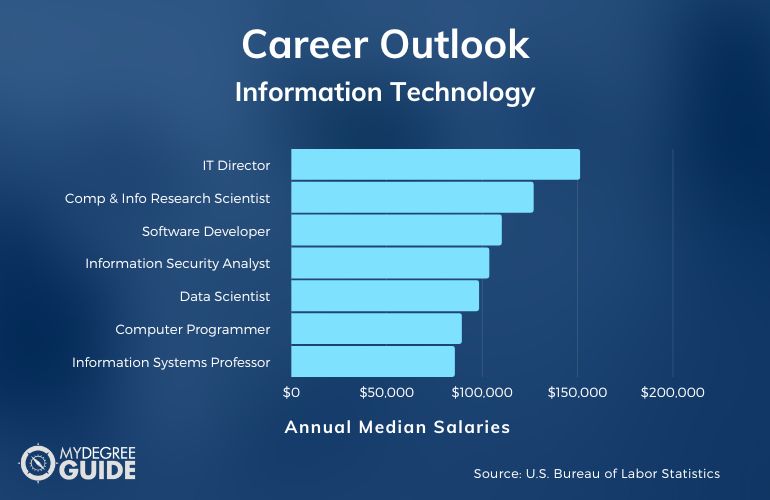An online PhD in information technology (IT) can help you advance your studies in one of the fastest-growing fields in America.

Editorial Listing ShortCode:
Before you apply, however, there are a few things that you should know about eligibility, coursework, financial assistance, and the admissions process.
Universities Offering Information Technology Online Ph.D. Degree Programs
Methodology: The following school list is in alphabetical order. To be included, a college or university must be regionally accredited and offer degree programs online or in a hybrid format.
1. Bowling Green State University
- PhD in Technology Management
Bowling Green State University is accredited by the Higher Learning Commission.
2. Capella University
- PhD in Information Technology
Capella University is accredited by the Higher Learning Commission.
3. Capitol Technology University
- PhD in Technology
Capitol Technology University is accredited by the Commission on Higher Education of the Middle States Association of Universities and Schools.
4. City University of Seattle
- Doctor of Information Technology
The City University of Seattle is accredited by the Northwest Commission on Colleges and Universities.
5. Colorado Technical University
- Doctor of Management – Technology Management
Colorado Technical University is accredited by the Higher Learning Commission.
6. Dakota State University
- PhD in Information Systems
Dakota State is accredited by the Higher Learning Commission.
7. Indiana State University
- PhD in Technology Management
Indiana State University is accredited by the Higher Learning Commission.
8. Iowa State University
- PhD in Information Systems
Iowa State University is accredited by the Higher Learning Commission of the North Central Association of Colleges and Schools.
9. Liberty University
- DBA in Information Systems
Liberty University is accredited by the Southern Association of Colleges and Schools Commission on Colleges.
10. North Carolina A & T State University
- PhD in Technology Management
North Carolina Agricultural and Technical State University is accredited by the Southern Association of Colleges and Schools Commission on Colleges.
11. National University
- PhD in Technology and Innovation Management
National University is regionally accredited by the Western Association of Schools and Colleges.
12. Nova Southeastern University
- PhD in Information Systems
NSU is accredited by the Southern Association of Colleges and Schools Commission on Colleges.
13. Texas Tech University
- PhD in Business Administration – Management Information Systems
Texas Tech University is accredited with the Southern Association of Colleges and Schools Commission on Colleges.
14. Towson University
- Doctor of Science in Information Technology
Towson University is accredited by the Middle States Commission on Higher Education.
15. University of Arkansas
- PhD in Information Systems
The U of A is accredited by the Higher Learning Commission.
16. University of Bridgeport
- PhD in Technology Management
The University of Bridgeport is accredited by the New England Association of Schools and Colleges.
17. University of Central Missouri
- PhD in Technology Management
The University of Central Missouri is accredited by the Higher Learning Commission.
18. University of Illinois – Chicago
- PhD in Management Information Systems
The University of Illinois at Chicago is accredited by the Higher Learning Commission.
19. University of the Cumberlands
- PhD in Information Technology
The University of the Cumberlands is accredited by the Southern Association of Colleges and Schools Commission on Colleges.
20. Walden University
- Doctor of Information Technology
Walden is accredited by The Higher Learning Commission.
Online PhD in Information Technology Degrees
There are several ways to earn a doctorate degree in information technology. The first option is a generalist program the teaches broad, wide-ranging skills that can be applied to many different jobs. The other options involve specialized PhD programs where you are expected to concentrate your studies on a single area of expertise.
Both of these fields offer plenty of opportunities for growth and careers to pursue.
Information Technology

Information technology draws from many disciplines, including business, finance, mathematics, and computer science. A PhD program is designed to strengthen students skills in these core areas while also preparing them for high-level research projects or leadership positions in the industry.
A doctorate degree in IT comes in two forms:
- Doctor of Philosophy (PhD) in Information Technology
- Doctor of Information Technology (DIT)
Each type of online information technology degree can help you learn many of the same things, and there’s a lot of crossover between classes, internships, and fellowships. Some colleges even promote the programs interchangeably.
Editorial Listing ShortCode:
If you want a specific acronym after your name, however, make sure that you’re following the right academic track.
Information Technology – Cyber Security

Cybersecurity is just one of the specializations that you can focus on with a graduate degree in information technology. It is designed to teach students all about computer systems and how to build, organize, connect, modify, and defend them.
Editorial Listing ShortCode:
There are several sub-specialties within cybersecurity studies, including:
- Data analytics
- Cryptology
- Research methods
- Information systems
- Big data
You might be required to take some or all of these courses even if you aren’t specializing. Many well-rounded cybersecurity degrees touch on many different disciplines to give students a diverse range of skills and abilities.
PhD in Information Technology Curriculum & Courses

Your classes as a PhD student will depend on what and where you’re studying. Every degree program is different. Speaking very generally, however, here are some names that you will likely see in a course catalog:
- Computer or Technology Foundation – Some colleges require these “entry-level” courses to make sure that you’re on par with other IT students. You might be allowed to waive them if you’ve already earned a bachelor’s or master’s in information technology.
- Applied Research Methods – You’ll spend a lot of time reading and referencing materials as a PhD student. These classes can help you refine your methods while also teaching you how to find, organize, and present information in a professional way.
- Data Analysis – Analytics are the backbone of an information technology degree, so you might be offered several courses in both quantitative and qualitative data analytics.
- Information Systems – Information systems are another critical component of IT, so expect to see many high-level classes in networks, databases, algorithms, and systems administration.
- Mathematics – Some IT programs offer graduate-level study in things like statistics and linear models. They’re usually optional unless you’re specializing in a math-heavy concentration.
- Teacher Training Seminar – If your career goals are in the educational field, you might be required to take teacher-training courses. Be aware that they could have face-to-face requirements despite being part of an online program.
- Cybersecurity – This is a degree in its own right, but many IT programs touch on the basics of data, privacy, and security. If you’re specializing in it, you may be able to expect advanced classes in cryptology, intrusion detection, systems design, web security, and information assurance.
- Programming – You can take programming classes at every level of study, including the doctorate level. You’ll need them for coding, debugging, and testing software systems.
- Dissertation Research and Preparation – Many PhD programs require a dissertation. You can usually take classes to help you prepare. They tend to offer research opportunities, technical skill-building, and academic guidance from professors, advisors, and mentors.
These few courses might be available to you if you’re seeking a PhD in information technology online. There will be plenty of others, so make sure to check out the course catalog.
PhD in Information Technology Careers & Salaries

Information technology can be a very profitable career. According to the U.S. Bureau of Labor Statistics, computer and information systems managers make on average $151,150 per year or $72.67 per hour.
That’s just an average, too. The biggest earners in the field can take home as much as $208,000 per year or $100 per hour. Other careers can be just as rewarding:
| Careers |
Annual Median Salary |
| IT Director |
$151,150 |
| Computer and Information Research Scientist |
$126,830 |
| Software Developer |
$110,140 |
| Information Security Analyst |
$103,590 |
| Data Scientist |
$98,230 |
| Computer Programmer |
$89,190 |
| Information Systems Professor |
$85,540 |
| Network and Computer Systems Administrator |
$84,810 |
| Web Developer |
$77,200 |
| Digital Forensics Analyst |
$60,590 |
Again, these are just averages, so be sure to look at the full ranges of what you can earn. It might be more; it might be less. You won’t get a realistic sense of a PhD in information technology salary until you look at all of the numbers.
Ultimately, these average annual salaries is what makes getting a PhD in this field worth it. The anticipated return on investment for a PhD degree is much higher than that of an accelerated information technology degree online, or even just a bachelor’s degree in IT.
Choosing an Online PhD in Information Technology Degree

Maybe you’ve decided to take the plunge and get an online PhD in information technology. Which universities should you consider? Where do you have the best chances of being admitted to a graduate program?
While everyone has their own criteria for a good school, there are some important things that students should think about.
- Accreditation – You’ll want to get your PhD from a reputable university. Programmatic accreditation is optional but regional and national accreditation is not.
- Selectivity – Some graduate programs are more competitive than others. Make sure to look at all of their admission requirements, and think about applying to back-up schools in addition to your top choices.
- Online accessibility – Can you do everything online? Will any seminars or workshops require face-to-face meetings? Are the classes synchronous or asynchronous?
- Specializations – This doesn’t matter if you’re going for a general information technology degree, but if you want to focus your studies on something specific, this means finding a doctorate program with the courses and concentrations that are relevant to you.
No matter if you are considering an online PhD or an online master’s in information technology, a general rule of thumb is that it’s a good idea to start your college search early. Don’t wait until the last minute to start gathering materials and filling out applications. Give yourself several months to do your research, make your inquiries, and talk to other PhD candidates.
Admissions Requirements

Admissions to a doctorate program can be quite competitive. Classes are typically kept small, and there’s usually a limited amount of funding for things like research projects and financial aid, so colleges have high standards for the PhD students that they’re willing to take on.
Here are a few things that might be required for a doctorate program:
- College transcripts – All graduate schools will want to see your GPA. They might also look for interest and proficiency in related subjects such as computer science, data structures, software development, systems engineering, and network administration.
- Graduate test scores – There are several standardized tests for graduate students, including the Graduate Record Examinations (GRE) and the Graduate Management Admission Test (GMAT). Your school may or may not require them for admission into their IT program.
- Resume or CV – Are you already active in the field? Would you bring any particular skills or experiences to the doctorate program? This is the place to make them known.
- Letters of recommendation – These can come from professors, mentors, bosses, and other people in a position of authority, but they’ll hold extra weight from alumni of the school or graduate program that you’re trying to enter.
- Statement of purpose – This is the graduate version of a personal essay. It’s your chance to sell yourself as a PhD candidate by detailing your work, education, research, career goals, and more.
At the end of the day, since every university is different, it’s important to do your homework about their individual graduate programs. They’ll have varying standards as well as their own unique practices and prerequisites.
Accreditation

As a degree holder, you probably already know about the importance of college accreditation. But were you aware that it’s just as critical for graduate students as undergrads?
For starters, it can take a while to complete a PhD program. You might be in school for anywhere from 3 – 5 years, possibly longer. If you ever need to transfer, it’s important that your credits transfer with you.
Another potential issue is your eligibility for various projects and programs. You could be rejected for things like grants and research opportunities if you aren’t attending an accredited grad school. You could also struggle to find employment with an unaccredited degree.
All things considered, it’s worth the effort of finding an accredited PhD program. Here are the three types of accreditation to consider:
- Regional accreditation
- National accreditation
- Programmatic accreditation
For more information, check out the Council for Higher Education Accreditation (CHEA). Not only do they explain the ins and outs of accreditation, but they also have databases, directories, and search engines for everything from individual colleges to overall program types.
PhD in Information Technology Professional Organizations

Industry organizations can provide many resources to students and working professionals. You don’t have to join one, but their benefits are often worth their membership dues. Here are just a couple of groups that might interest you as an IT student:
- Association of Information Technology Professionals – CompTIA is a network for both students and professionals in the IT world. It offers scholarships, competitions, events, products, career counseling, and more. College attendees can take advantage of a reduced-rate student membership.
- Society for Information Management – SIM is for senior professionals in information technology. You might not qualify for membership while you’re still in school, but when you meet their criteria, you’ll have access to all kinds of legal, technical, financial, and academic benefits.
There are other organizations that welcome IT students as well, so don’t be afraid to shop around. Look for a professional network that suits your exact needs, interests, and career goals.
Financial Aid & Scholarships

Financial aid is a little different as a graduate student, but it’s still possible to get it. Your first step should be filling out the Free Application for Federal Student Aid (FAFSA). You might have heard that PhD students aren’t eligible for Pell Grants anymore, but that’s only partially true; there are circumstances where low-income students can still receive it.
You may also have loan options with the FAFSA. You won’t qualify for a subsidized loan anymore, but you may be able to take out Direct Unsubsidized Loan or a Direct PLUS Loan for Graduate or Professional Students.
Outside of the FAFSA, you can look for grants, fellowships, internships, and work-study programs. Fellowships are particularly common for graduate students, so be sure to talk to your professors about opportunities.
Last but not least, consider applying for scholarships. Some are available to both undergraduate and graduate students; others are meant specifically for PhD candidates. As a future IT professional, you might have the best luck with scholarships that are earmarked for computer- and technology-based majors.

Is There a PhD in Information Technology?
Many colleges offer a PhD program for information technology. There are also PhD programs for related disciplines such as information systems, technology management and systems engineering.
They teach many of the same skills and subjects since there’s a lot of overlap in their fields. Additionally, you can choose to specialize in something like cybersecurity or database management with your information technology degree.
What Can I Do With a PhD in Information Technology?
You can do a lot with a doctorate in information technology. It can help qualify you for high-level jobs, especially if you specialize in a niche field where your skills will be in demand.
You can pursue a career in academia or research. You can even aim for a CEO job.
How Long Does It Take to Get a PhD in Information Technology?

It usually takes around 3 – 5 years to get a PhD in information technology. Depending on your school, your degree may require anywhere from 55 – 65 credits, and you might need to meet specialized course requirements as you go.
A highly motivated student could finish quickly, but a busy student with outside responsibilities could take longer. It all depends on your school, your schedule, and your specific doctorate program.
Can You Get an Accredited PhD in Information Technology Online?
It’s entirely possible to earn a PhD online. Many colleges have an “e-campus” where they offer the same classes with the same course requirements as their traditional, classroom-based degree programs; it’s just that all lessons are delivered virtually.
Most programs don’t mention on your transcript that you took online classes, either.
Is a PhD in Information Technology Worth It?

Yes, a PhD in Information Technology is worth it for many students. Computer and information technology occupations are projected to grow 11% over the next 10 years, much faster than the average for all occupations. Common careers in this field include digital forensics analyst, information systems professor, data scientist, information research scientist, and IT director.
The U.S. Bureau of Labor Statistics estimates that more than 531,000 jobs will be added to the industry in the next decade. An advanced degree can open a lot of doors in this quickly-evolving field.
Another thing to consider is your return on investment (ROI). This can be calculated by subtracting the total cost of your PhD program from the salary that you expect to earn once you graduate. How long will it take to pay off your loans? When will you start turning a profit?
What Jobs Can I Get with a Doctor of Information Technology Degree?

An online PhD in information technology can lead to many career prospects, including:
- University professor
- Computer or technology specialist
- Information security analyst
- Web developer
- Software engineer
- Network or database manager
You can also take your degree and apply it to IT research and development in other fields such as business, law, finance, education, and health administration. Every industry needs technology experts.
What does an Online PhD Information Technology Degree Cost?
Tuition rates can be wildly different depending on your school, location, degree type, credit load, and overall length of study. In general, however, you can expect to pay at least $300 per credit, and it usually takes around 55 – 65 credits to earn a PhD in information technology.
Just remember that these numbers are averages and not guarantees.
Getting Your PhD in Information Technology Degree Online

If you’re ready to take your career to the next level, an online PhD in information technology might be just what you need to stand out from the crowd.
Not only can it help you qualify for specialized, high-paying jobs, but it can also help you learn the skills that you’ll need to know to thrive in the industry. Consider contacting your local university to ask about their graduate programs for IT.
